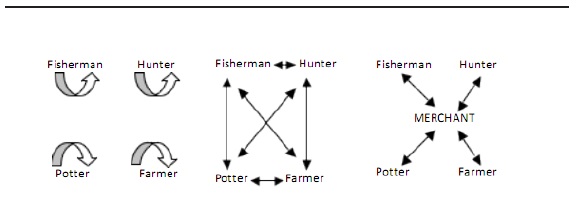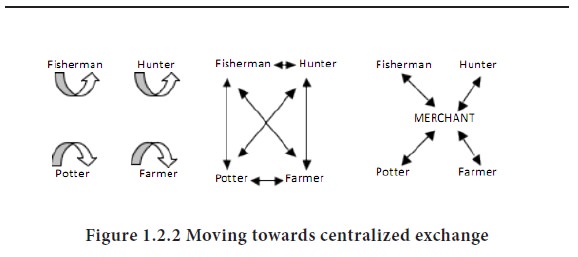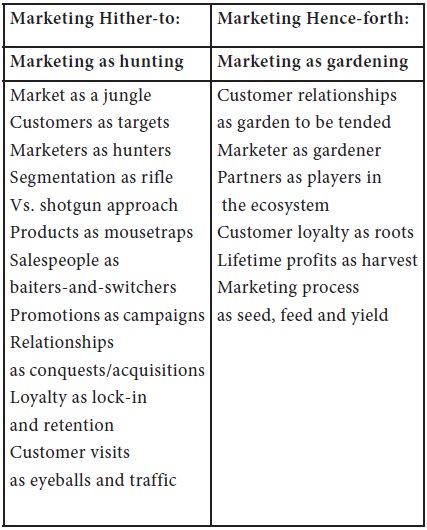MARKETING MANAGEMENT - Marketing Concepts
Markets - Marketing Concepts
Posted On :

The concept of transactions leads to the concept of a market. A market is the set of actual and potential buyers of a product.
Markets
The concept of transactions leads to the concept of a market. A market is the set of actual and potential buyers of a product. It may exist in a physical environment as a marketplace or in a virtual environment (on the internet platform) as a marketspace. To understand the nature of a market, imagine a primitive economy consisting of only four people – a farmer, a fisherman, a potter and a hunter. Figure 1.2.2 shows the different ways in which these traders could meet their needs. In the first case, self-sufficiency, they gather the needed goods for themselves. In the second case, decentralized exchange, each person sees the other three as potential buyers who make up a market. In the third case, centralized exchange, a new person called a merchant appears and locates in a central area called a marketplace. Each trader brings goods to the merchant and trades for other needed goods. Merchants and central marketplaces greatly reduce the total number of transactions needs to accomplish a given volume of exchange. As economies grow, exchange becomes even more centralized, as seen in the growth of huge companies. Large supermarkets now serve millions of people who formerly shopped in smaller outlets.

The internet and the resultant connected world has posed some special challenges and opportunities for marketers. Prof. Mohanbir Sawhney (Kellogg School of Management) has used two interesting metaphors (hunting Vs. gardening) to describe marketing hither-to and marketing hence-forth.

The underlying reason for this
shift is the rise of information democracy made possible by the internet. For
information symmetry (characterized by scarce information, ill-informed
customers, monologue kind-of exchanges and ‘command-and-control’ marketing) the
society is moving towards information democracy (characterized by ubiquitous
information, well-informed customers, conversations kind-of exchanges and ‘connect-and-collaborate’
marketing). The Cluetrain Manifesto (www.cluetrain.org)
describes markets as conversations in the following manner:
Markets are conversations. Their members communicate in language that is natural, open, honest, direct, funny and often shocking… Most corporations, on the other hand, only know how to talk in the soothing, humorless monotone of the mission statement, marketing brochure, and your-call-is-important-to-us busy signal. Same old tone, same old lies. No wonder networked markets have no respect for companies unable or unwilling to speak as they do.
In the connected world, the empowered customers can: (1) Get objective information for multiple suppliers without relying on the manufacturer or the retailer (e.g., Edmunds.com); (2) Initiate requests for information and advertising from manufacturers (e.g., DealTime.com); (3) Design and configure customized offerings (e.g., Dell.com); (4) Use buying agents to pit sellers against each other (e.g., Free markets Online); (5) Unbundle offerings and arbitrage across channels (e.g. Ritz Camera); (6) Pay by the minute, by the month, by the mile (e.g., IBM e-business on demand) and (7) Communicate with peers and experts for feedback on products and brands (e.g. Amazon.com and Epinions.com)
The concept of transactions leads to the concept of a market. A market is the set of actual and potential buyers of a product. It may exist in a physical environment as a marketplace or in a virtual environment (on the internet platform) as a marketspace. To understand the nature of a market, imagine a primitive economy consisting of only four people – a farmer, a fisherman, a potter and a hunter. Figure 1.2.2 shows the different ways in which these traders could meet their needs. In the first case, self-sufficiency, they gather the needed goods for themselves. In the second case, decentralized exchange, each person sees the other three as potential buyers who make up a market. In the third case, centralized exchange, a new person called a merchant appears and locates in a central area called a marketplace. Each trader brings goods to the merchant and trades for other needed goods. Merchants and central marketplaces greatly reduce the total number of transactions needs to accomplish a given volume of exchange. As economies grow, exchange becomes even more centralized, as seen in the growth of huge companies. Large supermarkets now serve millions of people who formerly shopped in smaller outlets.

The internet and the resultant connected world has posed some special challenges and opportunities for marketers. Prof. Mohanbir Sawhney (Kellogg School of Management) has used two interesting metaphors (hunting Vs. gardening) to describe marketing hither-to and marketing hence-forth.

Markets are conversations. Their members communicate in language that is natural, open, honest, direct, funny and often shocking… Most corporations, on the other hand, only know how to talk in the soothing, humorless monotone of the mission statement, marketing brochure, and your-call-is-important-to-us busy signal. Same old tone, same old lies. No wonder networked markets have no respect for companies unable or unwilling to speak as they do.
In the connected world, the empowered customers can: (1) Get objective information for multiple suppliers without relying on the manufacturer or the retailer (e.g., Edmunds.com); (2) Initiate requests for information and advertising from manufacturers (e.g., DealTime.com); (3) Design and configure customized offerings (e.g., Dell.com); (4) Use buying agents to pit sellers against each other (e.g., Free markets Online); (5) Unbundle offerings and arbitrage across channels (e.g. Ritz Camera); (6) Pay by the minute, by the month, by the mile (e.g., IBM e-business on demand) and (7) Communicate with peers and experts for feedback on products and brands (e.g. Amazon.com and Epinions.com)
Tags : MARKETING MANAGEMENT - Marketing Concepts
Last 30 days 1207 views












